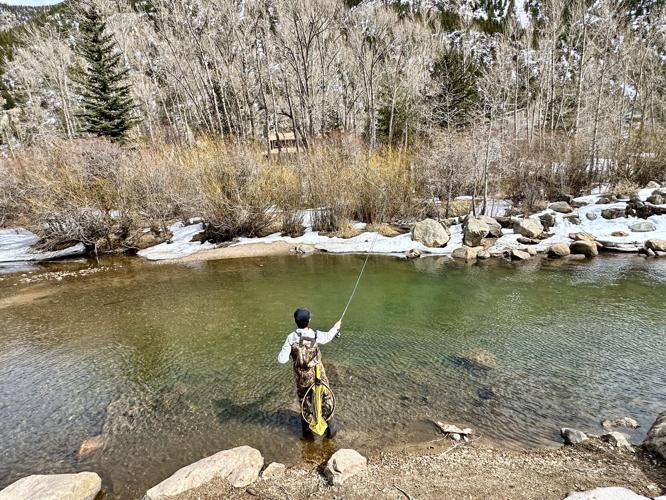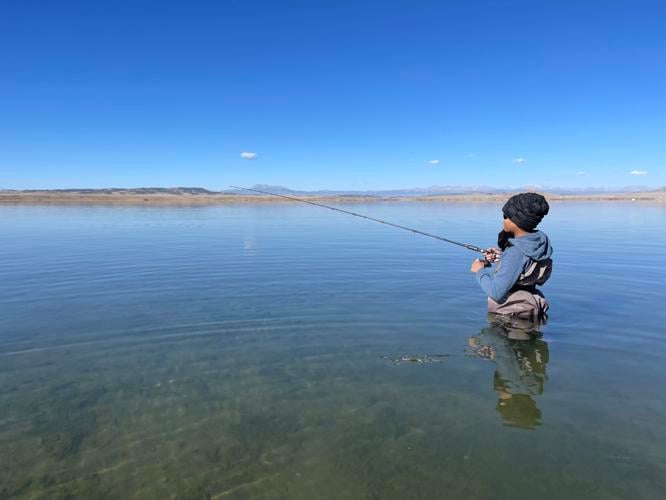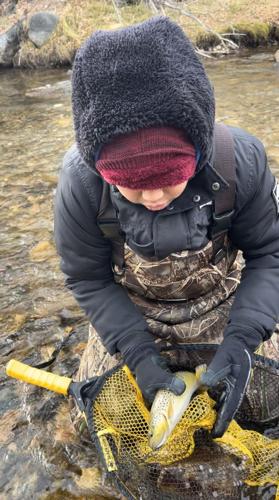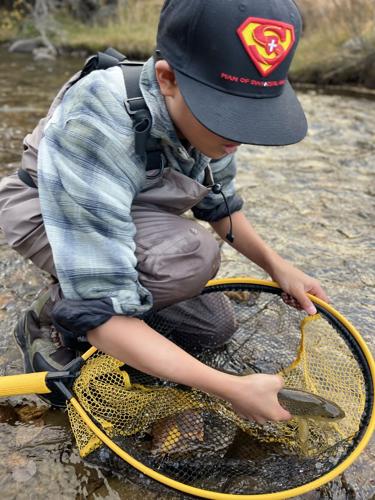How do you console an inconsolable 12-year-old boy?
We were driving home from Waterton Canyon, one of metro Denver's jewels, where we had spent half a day fishing, and, much to my child's dismay, caught nothing.
"Not even a tug," my son, Sol, said, bursting into a cry of anguish like only 12-year-old children do — with too much pain and as if nothing else mattered.
Something caught my eye on the horizon, just as the last afterglow of the Colorado sun faded away.
"Sol, look!" I said, pointing to the fireworks that began to appear in the night sky, showering the horizon with a kaleidoscope of red, blue and white. It was the Fourth of July.
I hoped the fireworks would distract my boy.
"Nice explosions," I said.
Without skipping a beat, he quipped back, "Yes — explosions. Just like my chances of catching a fish have exploded away."
That had been our first of what I had hoped to be a two-week fishing trip in the summer of 2023, and Sol's "explosion" of emotions, mostly despair, would be palpable throughout the trip, punctuated by a rare moment of ecstasy and, finally, on the last day night of our fishing trip, a calmness that washed over both of us as we watched the lights from a few stores dot a lake's shore and daintily refract, as if dancing on the water's surface.
But I'm getting ahead of myself.
I first brought Sol, now 12, to fishing when he was 4. I picked up a fishing rod for children at a local store, bought one for myself, and then we went straight for Lake Pleasant, a good 40-minute drive from Glendale, a suburb of metro Phoenix where we lived.
Lake Pleasant would become our go-to fishing place. The 10,000-acre reservoir, which holds water to quench the thirst of metro Phoenix's five million people, boasts of a healthy variety of fish, including bluegill, bass and sunfish. That October afternoon eight years ago, I fixed a hook on the line, attached a plastic worm and taught my kiddo how to cast and reel.
I didn't have the luxury of a ready-made casting rod growing up in a poverty-stricken town in Southern Philippines. For a rod, we used a bamboo stick. For line, we scraped whatever nylon we could scavenge from the shore, discarded by fishermen as they hauled their boats in and out of the sandy beach. I grew up in a fishing town, so nylons weren't hard to obtain if you knew where to look.
I didn't have any plastic worms, either. They wouldn't work there anyway. Instead, I dug up sand worms and placed them in a coconut shell. The sand worms were easy to find — again, if you knew where to look.
Fishing wasn't a hobby. It was partly a necessity. Mostly, it was just what you do growing up in a coastal village. My family was among the poorest in town, and, once, when a gnarly storm struck and hammered the trees flat, we found ourselves without food for several days. So, I learned to scavenge — for food, school supplies, fishing lines — as soon as I could walk.
And fishing supplemented our food source.
I grew up in the kind of poverty that forces a lot of kids to be especially creative. I couldn't afford to buy a fishing hook, so I made one out of a stapler pin. I didn't invent that. Instead, generations of poor kids before me learned that skill, passing them down to half-starved boys and girls as soon as their fingers are sufficiently dexterous. To fashion a hook out of a stapler pin, you had to learn to flatten one end and sharpen the other.
And you better not lose it.
I caught a lot of small fish, which my mom would fry using pork lard. Rice is a staple in the Philippines, but you need protein, and fish supply protein, although we didn't think in those terms.
So, when my boy was born, I vowed to teach him how to fish.
And, boy, he fell in love with fishing quickly.
That October afternoon, when he was 4, he caught a big bass. He felt the tug, he pulled, the fish ran away, but, with the hook in its mouth, there was no escape. I still have a picture of him beaming, the kind of feel-good memory that was seared into his brain.
"Remember the day I caught a big bass, dad?"
He still talks about that day.
"Oh, yes," I'd reply.
"I'd like to catch another big bass again," he'd tell me.
"Remember the rule?" I'd ask.
"Oh, yes, dad," he'd reply. "If you take a life, you eat it."
I wasn't conscious of such a rule while growing up in the Philippines, where we fished and hunted, and we ate what we killed. Food is food — and you never waste food.
My boy, fortunately or not, can never imagine the kind of abject poverty that is so familiar, constant and endemic in so many parts of the world. Poverty-driven hunger is incessant, a throbbing pain in your stomach that never goes away. Today, about 19% of Filipinos live below their country's national poverty line, which stands at $221 per month for a family of five. My single mom earned, at most, a few pennies a day in the 1980s. My family scraped the very bottom of that poverty barrel, an almost hand-to-mouth existence.
What separated us from complete deprivation was the roof over our heads. We had a hut. We didn't beg in the streets.
I fished almost every day in the Philippines, with a bamboo rod, scavenged line and hand-made hook. What I remember most clearly is the game I had to play to land a fish, of patiently waiting just for the right tug to pull.
I suspect the excitement of that "tug" can be traced back to the dawn of history, when men first discovered fishing. A decade ago, Australian researchers published their discovery of what they believe to be the first evidence for maritime fishing — deep ocean fishing, in particular — in East Timor, describing the "earliest definite evidence for fishhook manufacture in the world." The evidence suggested that human beings went ocean fishing and captured tuna about 42,000 years ago.
In my mind, it made sense the researchers discovered that first fishhook in East Timor, which lies about 1,630 miles south of the Philippines. Both countries are in Southeast Asia, which boasts some of the most diverse maritime life in the world.
When my son first experienced that "tug," he was hooked, and I cultivated his love for fishing.
For his 12th birthday, I promised two weeks of fishing, soliciting advice from as many avid fishermen as I could about lakes and streams to visit. All told, we hit eight fishing sites.
We also discovered fly fishing, a technique that uses an artificial lure that mimics insects such as a fly or mosquito.
I bought two ready-made fly rods, complete with a reel and other parts you need to fly fish.
For lures, I asked everybody.
One day I ran into Joe Prinzi at a local store. Joe took his time to teach me the basics, and, more importantly, set me up for a simple fly fishing kit. Over the months, I would send him photos of our fly fishing adventures and he would reply with encouraging words.
"It looks like he is more than getting the hang of it," he replied one time.
"Soon, he will be showing me how to catch first," he said at another time.
Indeed, Sol would absorb fly fishing lessons like a sponge.
"Do you have a zebra midge, size 22 to 24?" he blurted out as I opened the door to Ascent Fishing, a local fly shop in Littleton. The store, recommended by Denver Gazette Sports Editor Paul Klee, became our favorite go-to spot for flies. Peter Stitcher, an aquatic biologist and the store's founder, at first didn't seem to know what quite to make of Sol, who immediately peppered him with questions about fly fishing.
It didn't take long for Sol to win him over, and Peter came to expect the staccato of queries.
But, like I said, I'm getting ahead of myself.
On that July 4 night, I tucked Sol to bed and kissed his forehead. Our time at Waterton Canyon, probably one of the most family-friend parks in metro Denver, zapped his energy. But not catching anything zapped his soul.
Over the next eight locations, the heartache would repeat itself. But, as time wore on, I saw a notable change in Sol. He began to enjoy his time in the streams and lakes. He'd still get upset at not catching anything, but I'd also see him dancing in his waders.
On our final trip, I asked him if he wanted to pack up after sundown.
"No, dad. Let's stay awhile more," he said.
Then the sun completely hid itself, and nighttime came. A gentle breeze touched our cheeks as we watched the flicker of light dance on the surface of Georgetown Lake.
We still hadn't caught anything.
"I love you, dad," he said. "I really enjoyed our time together these last few days. I know I'm growing up fast, but I wish we could just stay like this. Can we still go fly fishing even when I'm older?" he asked me.
"Sol," I replied, "nothing would give me more joy than to spend time with you."
Then he squeezed my right hand, and soon, it was time to go home.











(0) comments
Welcome to the discussion.
Log In
Keep it Clean. Please avoid obscene, vulgar, lewd, racist or sexually-oriented language.
PLEASE TURN OFF YOUR CAPS LOCK.
Don't Threaten. Threats of harming another person will not be tolerated.
Be Truthful. Don't knowingly lie about anyone or anything.
Be Nice. No racism, sexism or any sort of -ism that is degrading to another person.
Be Proactive. Use the 'Report' link on each comment to let us know of abusive posts.
Share with Us. We'd love to hear eyewitness accounts, the history behind an article.